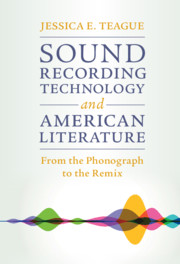Book contents
- Sound Recording Technology and American Literature
- Cambridge studies in American Literature and Culture
- Sound Recording Technology and American Literature
- Copyright page
- Dedication
- Contents
- Figures
- Acknowledgments
- Introduction Resonant Reading
- Chapter 1 Ears Taut to Hear
- Chapter 2 Ethnographic Transcription and the Jazz Auto/Biography
- Chapter 3 Press Play
- Chapter 4 The Stereophonic Poetics ofLangston Hughes and Amiri Baraka
- Chapter 5 From Cut-up to Mashup
- A Post-Electric Postscript Recording and Remix Onstage
- Notes
- Works Cited
- Index
- Recent Books In This Series (continued from page ii)
Chapter 2 - Ethnographic Transcription and the Jazz Auto/Biography
Alan Lomax, Jelly Roll Morton, Zora Neale Hurston, and Sidney Bechet
Published online by Cambridge University Press: 07 May 2021
- Sound Recording Technology and American Literature
- Cambridge studies in American Literature and Culture
- Sound Recording Technology and American Literature
- Copyright page
- Dedication
- Contents
- Figures
- Acknowledgments
- Introduction Resonant Reading
- Chapter 1 Ears Taut to Hear
- Chapter 2 Ethnographic Transcription and the Jazz Auto/Biography
- Chapter 3 Press Play
- Chapter 4 The Stereophonic Poetics ofLangston Hughes and Amiri Baraka
- Chapter 5 From Cut-up to Mashup
- A Post-Electric Postscript Recording and Remix Onstage
- Notes
- Works Cited
- Index
- Recent Books In This Series (continued from page ii)
Summary
Given the increasingly important role that music, especially jazz, played in the American literary soundscape, my second chapter explores two instances of jazz autobiography: Alan Lomax’s Mister Jelly Roll: The Fortunes of Jelly Roll Morton, New Orleans Creole and “Inventor of Jazz” (1950) and Sidney Bechet’s Treat It Gentle (1960). Through my analysis, I reveal the critical intervention of Zora Neale Hurston in shaping the practices of transcription so that the voices represented on the page adhere to the “laws of sound.” While the tendency has been to read Lomax and Bechet’s books in the context of popular jazz autobiography, I argue that the avant-garde nature of their transcription practices warrant their consideration alongside more canonical works of modernist prose. These books are not oral histories but rather aural histories that require readers to think critically about the sonic identities of musicians who themselves experimented with recording technology.
Keywords
- Type
- Chapter
- Information
- Sound Recording Technology and American LiteratureFrom the Phonograph to the Remix, pp. 56 - 92Publisher: Cambridge University PressPrint publication year: 2021

